Module 5 Museums Unit 3 Language in use. 课件(共33张PPT,无音频)
文档属性
| 名称 | Module 5 Museums Unit 3 Language in use. 课件(共33张PPT,无音频) | 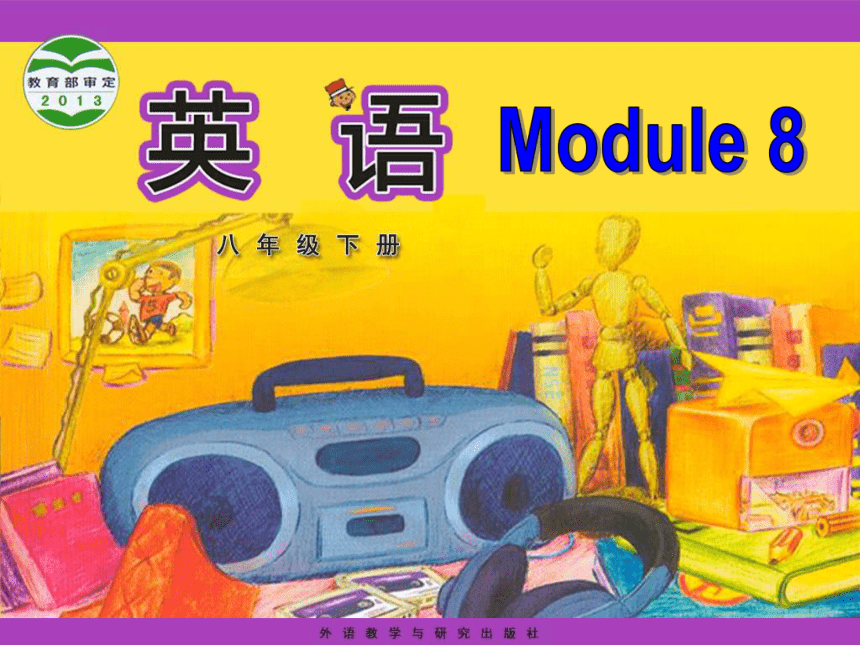 | |
| 格式 | zip | ||
| 文件大小 | 3.3MB | ||
| 资源类型 | 教案 | ||
| 版本资源 | 外研版 | ||
| 科目 | 英语 | ||
| 更新时间 | 2020-07-30 22:08:08 | ||
图片预览

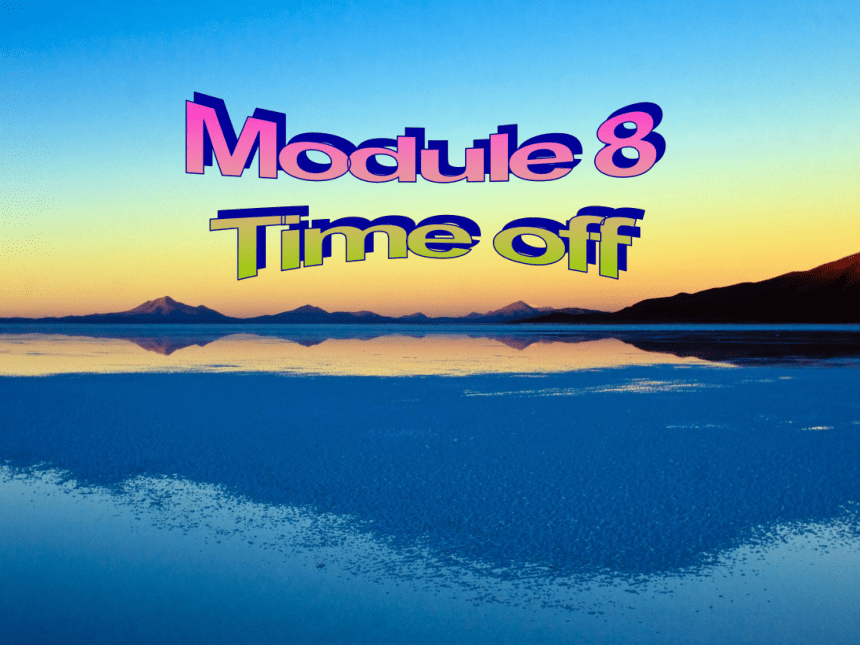
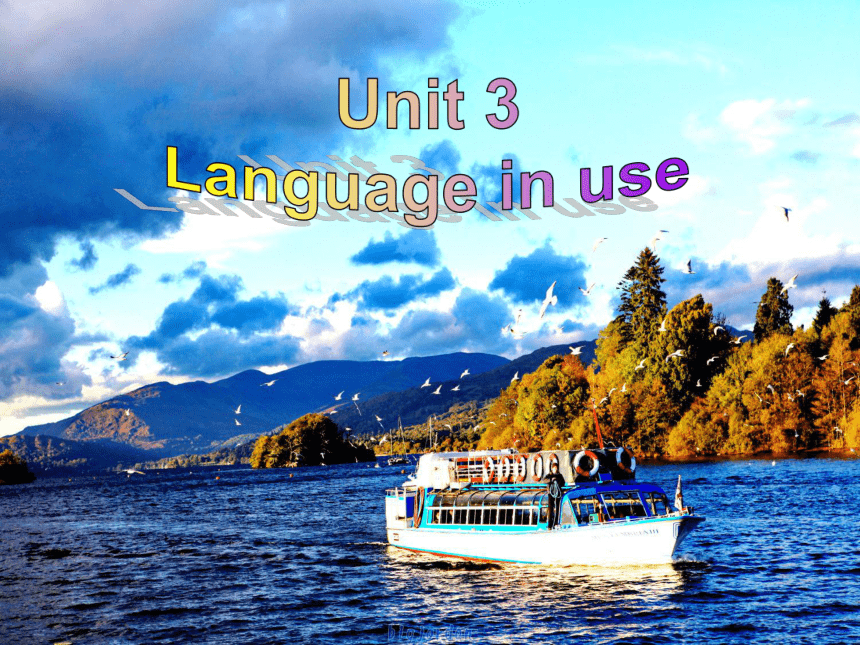
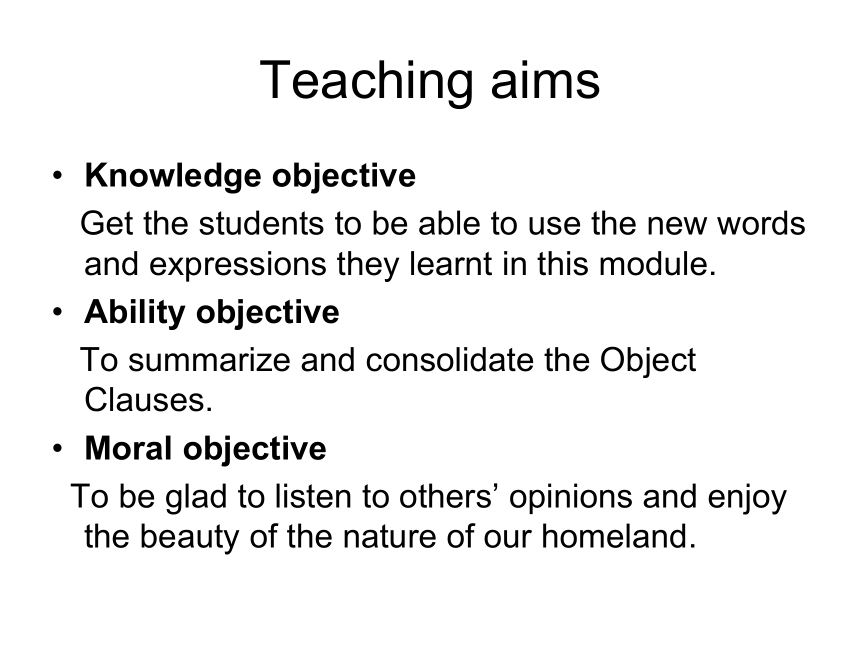
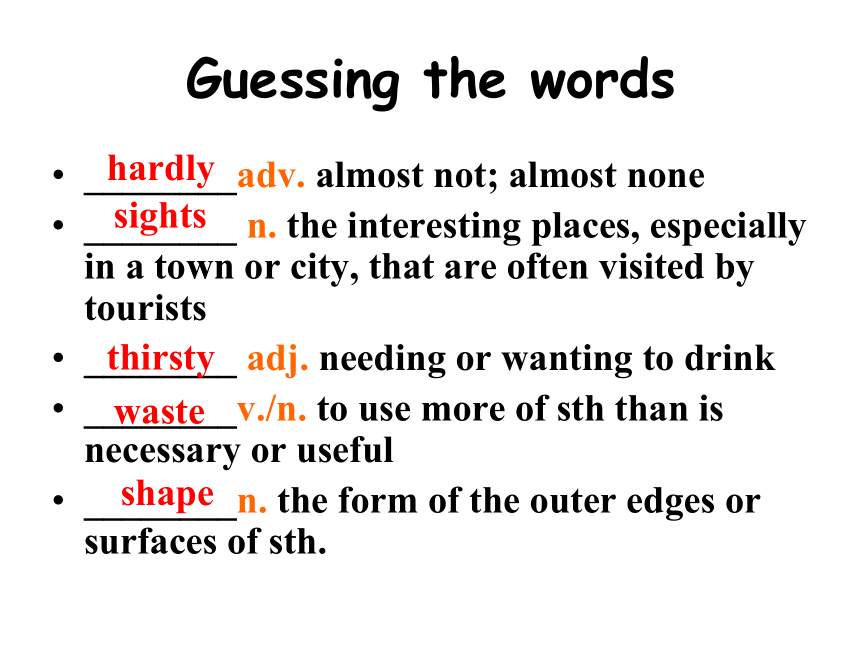
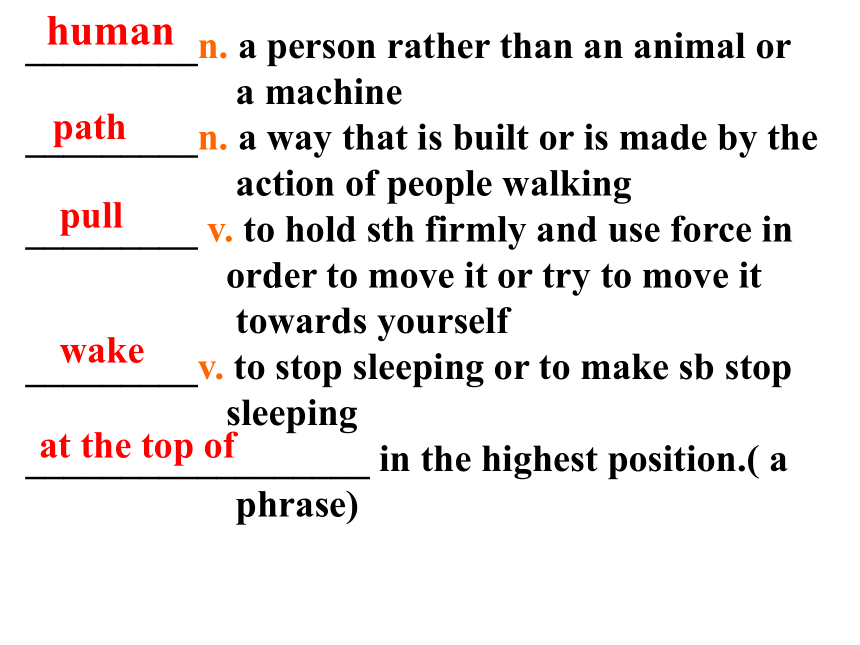
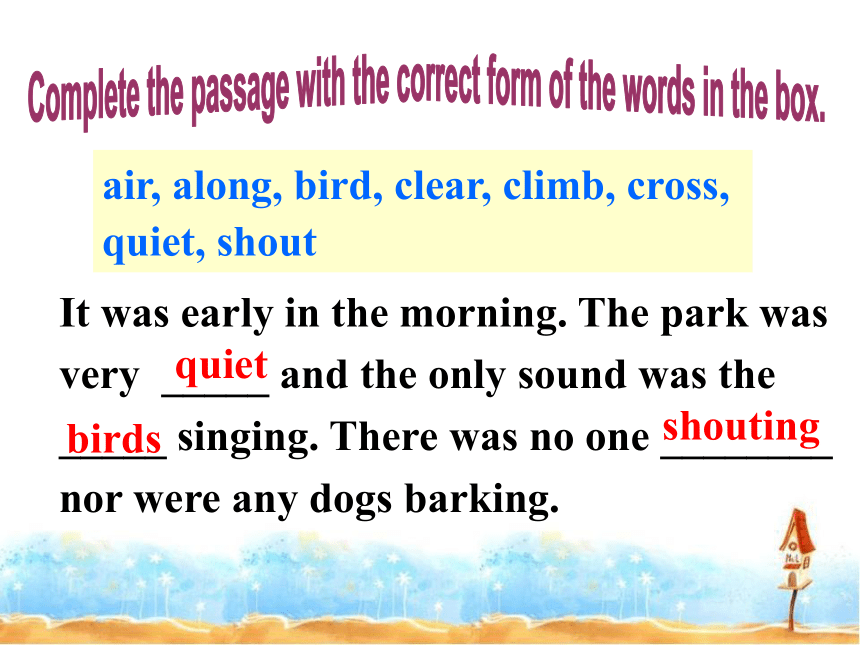
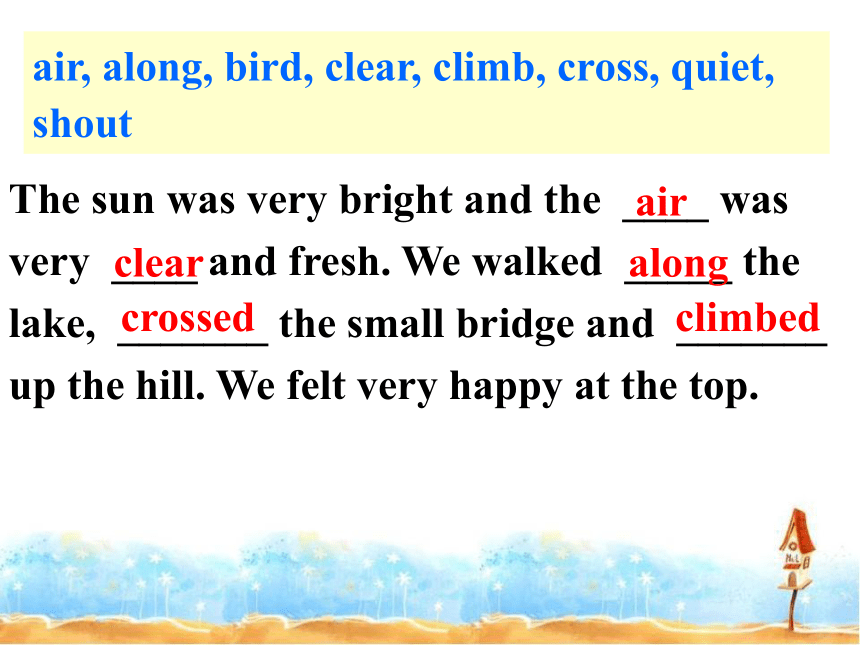
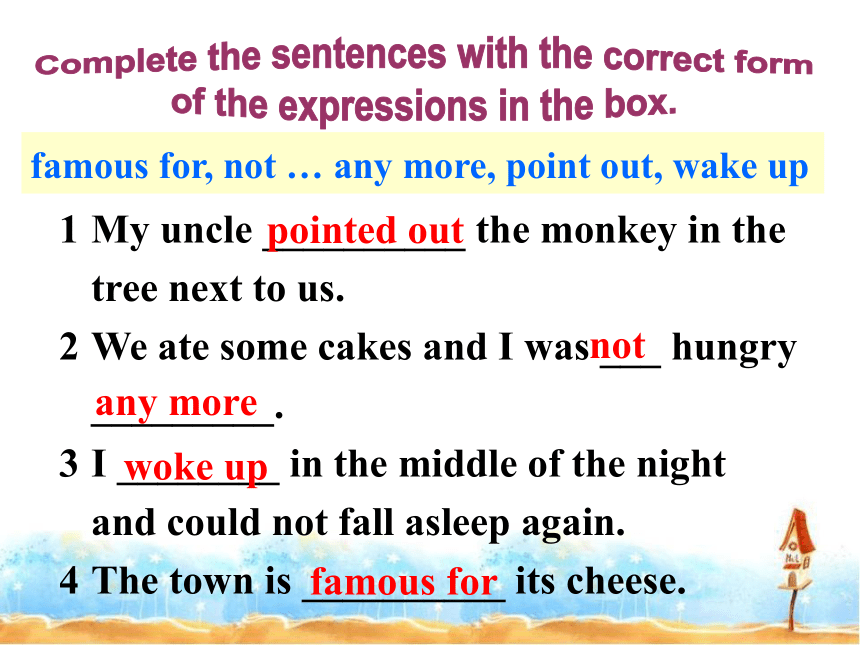
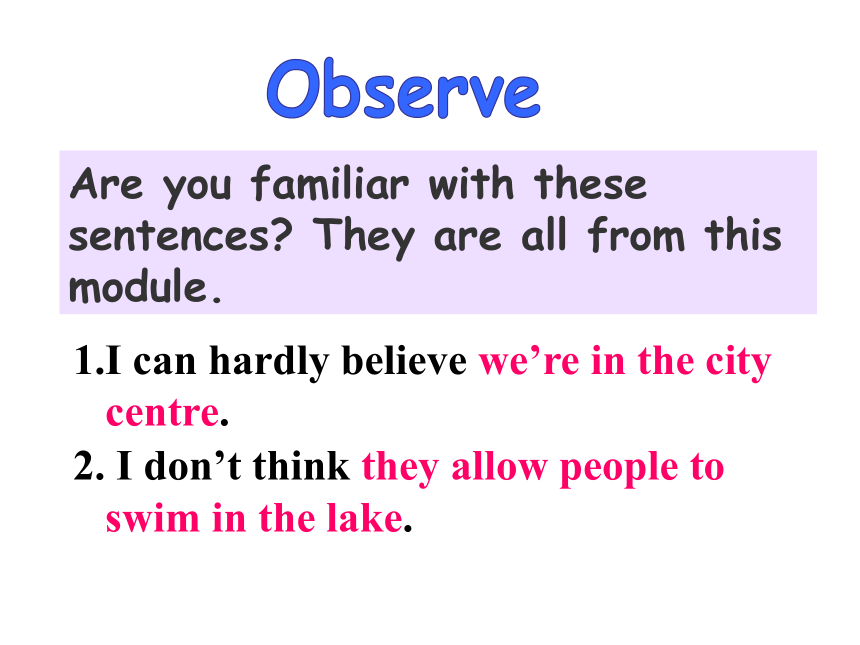
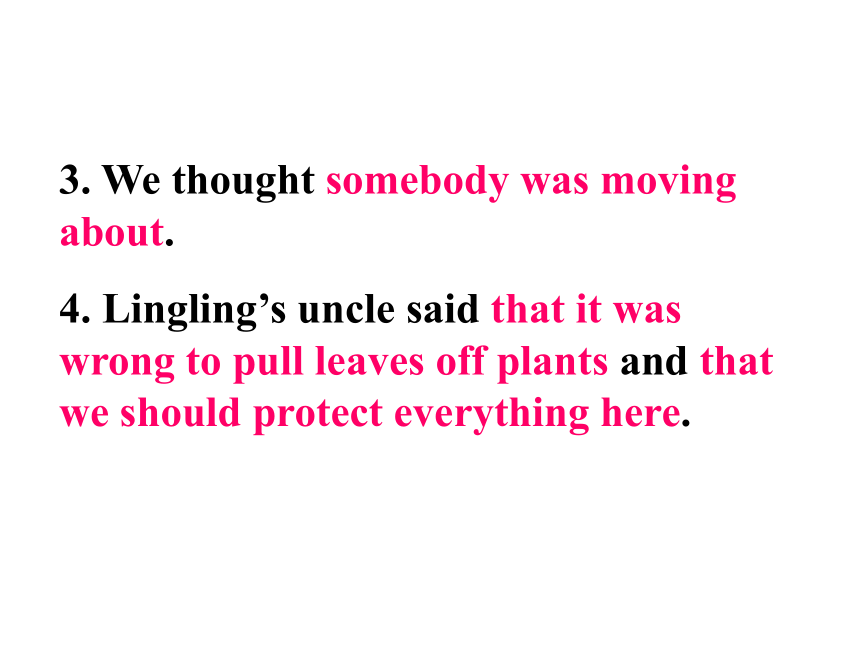

文档简介
(共33张PPT,无音频)
Teaching
aims
Knowledge
objective
Get
the
students
to
be
able
to
use
the
new
words
and
expressions
they
learnt
in
this
module.
Ability
objective
To
summarize
and
consolidate
the
Object
Clauses.
Moral
objective
To
be
glad
to
listen
to
others’
opinions
and
enjoy
the
beauty
of
the
nature
of
our
homeland.
Guessing
the
words
________adv.
almost
not;
almost
none
________
n.
the
interesting
places,
especially
in
a
town
or
city,
that
are
often
visited
by
tourists
________
adj.
needing
or
wanting
to
drink
________v./n.
to
use
more
of
sth
than
is
necessary
or
useful
________n.
the
form
of
the
outer
edges
or
surfaces
of
sth.
hardly
sights
thirsty
waste
shape
_________n.
a
person
rather
than
an
animal
or
a
machine
_________n.
a
way
that
is
built
or
is
made
by
the
action
of
people
walking
_________
v.
to
hold
sth
firmly
and
use
force
in
order
to
move
it
or
try
to
move
it
towards
yourself
_________v.
to
stop
sleeping
or
to
make
sb
stop
sleeping
__________________
in
the
highest
position.(
a
phrase)
human
path
pull
wake
at
the
top
of
It
was
early
in
the
morning.
The
park
was
very
_____
and
the
only
sound
was
the
_____
singing.
There
was
no
one
________
nor
were
any
dogs
barking.
quiet
birds
shouting
air,
along,
bird,
clear,
climb,
cross,
quiet,
shout
The
sun
was
very
bright
and
the
____
was
very
____
and
fresh.
We
walked
_____
the
lake,
_______
the
small
bridge
and
_______
up
the
hill.
We
felt
very
happy
at
the
top.
air
clear
along
crossed
climbed
air,
along,
bird,
clear,
climb,
cross,
quiet,
shout
My
uncle
__________
the
monkey
in
the
tree
next
to
us.
We
ate
some
cakes
and
I
was
___
hungry
_________.
I
________
in
the
middle
of
the
night
and
could
not
fall
asleep
again.
The
town
is
__________
its
cheese.
any
more
not
pointed
out
famous
for,
not
…
any
more,
point
out,
wake
up
woke
up
famous
for
Are
you
familiar
with
these
sentences?
They
are
all
from
this
module.
I
can
hardly
believe
we’re
in
the
city
centre.
2.
I
don’t
think
they
allow
people
to
swim
in
the
lake.
3.
We
thought
somebody
was
moving
about.
4.
Lingling’s
uncle
said
that
it
was
wrong
to
pull
leaves
off
plants
and
that
we
should
protect
everything
here.
that引导的宾语从句
还记得我们在第六单元学过的基本句型“主语+谓语+宾语”的结构吗?找出下列句子的宾语:
I
need
a
pen.
He
helped
Mr
Black
.
Children
stopped
talking.
I
do
not
want
to
cry.
He
knew
(that)
he
should
study
hard.
名词
代词
动词的-ing形式
动词的
to
do形式
句子
放在动词后面作宾语的句子叫宾语从句。
I
hope
(that)
it
will
snow
this
winter.
I
believe
(that)
we
shall
become
good
friends.
Betty
thinks
(that)
trees
can
improve
the
air.
当谓语动词表示肯定的概念,如“希望”“相信”“知道”或“说”时,其后面的句子一般用that引导。that没有任何词汇意义,只起引导作用,多数情况下可以省略。例如:
注意一:
并非所有的动词后面都可接that引导的宾语从句。常接that引导的宾语从句的谓语动词有:believe,
expect,
explain,
feel,
hear,
hope,
imagine,
prefer,
promise,
report,
say,
see,
tell,
think,
understand,
warn,
wish等。
注意
think,?believe,?suppose等动词作主句的谓语,且主句的主语是第一人称时,宾语从句的否定,习惯上要转移到主句中,即“否定转移”。?如:
I?don’t?believe?that?he?will?do?such?a?silly?thing.?
我相信他不会做如此愚蠢的事。
注意三:
有些宾语从句不能省略that。
如果谓语动词后跟有两个或更多个并列的宾语从句,第二个及以后的that都不可以省略。例如:
He
said
(that)
the
book
was
very
interesting
and
that(不省略)
all
the
children
like
to
read
it.
2)
主语中有it作形式宾语,that不可省。
I
think
it
necessary
that
he
should
stay
here.?
1.
I
can
hardly
believe
_____
we’re
in
the
city
centre.
2.
I’m
sure
______
it’ll
be
fantastic
to
see
the
city
from
the
top.
3.
I
don’t
think
______they
allow
people
to
swim
in
the
lake.
4.
I
think
_______
it’s
better
to
have
our
picnic
at
the
top
of
the
hill.
5.
I
hope
______
it
will
be
cooler
up
there.
(that)
(that)
(that)
(that)
(that)
go
Ready?
6.
We
thought
_______
somebody
was
moving
about.
7.
Lingling’s
uncle
said
_____
it
was
an
animal.
8.
We
found
______
it
was
just
a
hungry
monkey
looking
for
food.
9.
Lingling’s
uncle
said
______
it
was
wrong
to
pull
leaves
off
plants
and
______
we
should
protect
everything
here.
(that)
(that)
(that)
(that)
that
1
I
think
(that)
2
He
says
(that)
3
She
is
sure
(that)
...
4
They
do
not
believe
(that)…
5
We
know
(that)…
a)
…we
can
go
out
alone
at
night.
b)
…he
almost
got
lost
in
the
forest.
c)
…we
should
stay
together.
d)
…the
park
is
over
500
years
old.
e)
…we
will
see
better
from
up
here.
Match
the
two
parts
of
the
sentences.
There
may
be
more
than
one
possibility.
1
I
think
(that)
…
2
He
says
(that)…
3
She
is
sure
(that)…
4
They
do
not
believe
(that)…
5
We
know
(that)…
a)…we
can
go
out
alone
at
night.
b)…he
almost
got
lost
in
the
forest.
c)…we
should
stay
together.
d)…the
park
is
over
500
years
old.
e)…we
will
see
better
from
up
there.
I
want
to
go
on
a
trip
with
my
family
in
the
summer
holiday,
but
I
do
not
think
we
(1)
________
(agree)
on
where
to
go.
I
think
that
we
should
(2)
___
(go)
to
the
beach
but
Mum
and
Dad
say
they
(3)
_____
(want)
to
go
to
the
countryside.
will
agree
go
want
Danny
is
sure
that
the
beach
and
the
countryside
(4)
___
(be)
boring.
He
wants
to
go
to
a
big
city
and
do
sightseeing.
Milly
doesn’t
think
that
sightseeing
(5)
___
(be)
interesting.
She
wants
to
stay
at
home
and
watch
TV
or
go
swimming.
I
tell
my
family
that
we
(6)
_______
(have
to)
decide
soon
because
the
holiday
starts
next
week!
are
is
have
to
1
P1
2
Dance
to
the
music
of
the
world!
3
Film
night
1
Welcome
to
our
photo
club!
_____
2
Dance
to
the
music
of
the
world!
_____
3
Film
night
_____
B
A
C
Holiday
plan:
Number
of
people:
Things
to
take:
Where
to
sleep:
What
to
eat:
go
climbing
in
the
mountains,
camp
out,
cook
food
15
mobile
phone,
lots
of
warm
clothing
camp
out
food
cooked
by
themselves
Lake
District
National
Park
Lake
District
National
Park
is
in
the
north
of
England.
It
is
England’s
biggest
national
park.
It
is
very
beautiful,
with
hills,
lakes
and
forests.
Most
visitors
enjoy
walking
around
the
lakes
or
climbing
up
the
mountains.
The
highest
mountain
in
England
is
in
Lake
District
National
Park.
On
a
clear
day,
you
can
see
a
long
way
from
the
top
of
the
mountain.
Walkers
have
to
be
careful
because
the
weather
can
change
suddenly,
especially
in
the
mountains.
The
Lake
District
is
popular
with
artists
who
like
to
paint
the
beautiful
countryside.
Many
English
poets
have
written
poems
about
the
beautiful
landscape,
and
these
poems
have
made
the
Lake
District
even
more
famous.
Where
is
it?
What
can
you
do
there?
When
can
you
go?
How
many
people
are
there
in
each
group?
How
long
will
you
stay?
What
have
people
said
about
their
trip
to
the
place?
7.
Work
in
pairs.
Think
about
a
holiday
trip
to
a
place
of
interest
and
answer
the
following
questions.
Writing
a
leaflet
for
a
trip
8.
Write
a
leaflet
for
the
trip.
Use
your
answers
to
the
questions
in
Activity
7
and
the
language
points
below
to
help
you.
Come
to
…
for
your
holiday.
You
can
…
You’ll
be
in
a
group
of…people.
You’ll
stay
for
…days.
Many
people
have
said
that
the
trip
is
very
enjoyable.
Possible
answer
Come
to
the
lovely
Li
River
for
a
wonderful
hiking
holiday!
Our
trips
are
for
groups
of
20
people,
so
come
with
your
friends
or
make
new
ones!
The
holiday
hiking
lasts
for
three
days
in
the
early
summer
months.
Spend
your
first
afternoon
in
Caoping
Village.
Walk
through
the
rice
fields
and
see
Crown
Cave.
Then
enjoy
your
evening
in
a
fine
hotel.
You
will
love
it!
The
next
day
you
will
hike
and
travel
by
boat
to
Yangdi
Village,
seeing
beautiful
mountains,
waterfalls
and
bamboo
forests
along
the
way.
Everything
is
quiet
and
relaxing,
the
air
is
clear
and
the
loudest
noise
is
the
birds
singing.
A
delicious
dinner
waits
for
you
at
the
end
of
the
journey.
On
the
third
day,
we
take
you
to
Moon
Hill.
You
can
climb
about
800
steps
to
see
fantastic
scenery.
Finally
we
take
you
to
Guilin
Airport,
happy
after
your
great
adventure!
Do
not
wait
too
long
—
call
now
for
a
wonderful
trip
to
the
Li
River.
You
have
won
a
trip
for
5
people
to
go
to
Australia.
Please
write
a
trip
plan
about
60
words.
Teaching
aims
Knowledge
objective
Get
the
students
to
be
able
to
use
the
new
words
and
expressions
they
learnt
in
this
module.
Ability
objective
To
summarize
and
consolidate
the
Object
Clauses.
Moral
objective
To
be
glad
to
listen
to
others’
opinions
and
enjoy
the
beauty
of
the
nature
of
our
homeland.
Guessing
the
words
________adv.
almost
not;
almost
none
________
n.
the
interesting
places,
especially
in
a
town
or
city,
that
are
often
visited
by
tourists
________
adj.
needing
or
wanting
to
drink
________v./n.
to
use
more
of
sth
than
is
necessary
or
useful
________n.
the
form
of
the
outer
edges
or
surfaces
of
sth.
hardly
sights
thirsty
waste
shape
_________n.
a
person
rather
than
an
animal
or
a
machine
_________n.
a
way
that
is
built
or
is
made
by
the
action
of
people
walking
_________
v.
to
hold
sth
firmly
and
use
force
in
order
to
move
it
or
try
to
move
it
towards
yourself
_________v.
to
stop
sleeping
or
to
make
sb
stop
sleeping
__________________
in
the
highest
position.(
a
phrase)
human
path
pull
wake
at
the
top
of
It
was
early
in
the
morning.
The
park
was
very
_____
and
the
only
sound
was
the
_____
singing.
There
was
no
one
________
nor
were
any
dogs
barking.
quiet
birds
shouting
air,
along,
bird,
clear,
climb,
cross,
quiet,
shout
The
sun
was
very
bright
and
the
____
was
very
____
and
fresh.
We
walked
_____
the
lake,
_______
the
small
bridge
and
_______
up
the
hill.
We
felt
very
happy
at
the
top.
air
clear
along
crossed
climbed
air,
along,
bird,
clear,
climb,
cross,
quiet,
shout
My
uncle
__________
the
monkey
in
the
tree
next
to
us.
We
ate
some
cakes
and
I
was
___
hungry
_________.
I
________
in
the
middle
of
the
night
and
could
not
fall
asleep
again.
The
town
is
__________
its
cheese.
any
more
not
pointed
out
famous
for,
not
…
any
more,
point
out,
wake
up
woke
up
famous
for
Are
you
familiar
with
these
sentences?
They
are
all
from
this
module.
I
can
hardly
believe
we’re
in
the
city
centre.
2.
I
don’t
think
they
allow
people
to
swim
in
the
lake.
3.
We
thought
somebody
was
moving
about.
4.
Lingling’s
uncle
said
that
it
was
wrong
to
pull
leaves
off
plants
and
that
we
should
protect
everything
here.
that引导的宾语从句
还记得我们在第六单元学过的基本句型“主语+谓语+宾语”的结构吗?找出下列句子的宾语:
I
need
a
pen.
He
helped
Mr
Black
.
Children
stopped
talking.
I
do
not
want
to
cry.
He
knew
(that)
he
should
study
hard.
名词
代词
动词的-ing形式
动词的
to
do形式
句子
放在动词后面作宾语的句子叫宾语从句。
I
hope
(that)
it
will
snow
this
winter.
I
believe
(that)
we
shall
become
good
friends.
Betty
thinks
(that)
trees
can
improve
the
air.
当谓语动词表示肯定的概念,如“希望”“相信”“知道”或“说”时,其后面的句子一般用that引导。that没有任何词汇意义,只起引导作用,多数情况下可以省略。例如:
注意一:
并非所有的动词后面都可接that引导的宾语从句。常接that引导的宾语从句的谓语动词有:believe,
expect,
explain,
feel,
hear,
hope,
imagine,
prefer,
promise,
report,
say,
see,
tell,
think,
understand,
warn,
wish等。
注意
think,?believe,?suppose等动词作主句的谓语,且主句的主语是第一人称时,宾语从句的否定,习惯上要转移到主句中,即“否定转移”。?如:
I?don’t?believe?that?he?will?do?such?a?silly?thing.?
我相信他不会做如此愚蠢的事。
注意三:
有些宾语从句不能省略that。
如果谓语动词后跟有两个或更多个并列的宾语从句,第二个及以后的that都不可以省略。例如:
He
said
(that)
the
book
was
very
interesting
and
that(不省略)
all
the
children
like
to
read
it.
2)
主语中有it作形式宾语,that不可省。
I
think
it
necessary
that
he
should
stay
here.?
1.
I
can
hardly
believe
_____
we’re
in
the
city
centre.
2.
I’m
sure
______
it’ll
be
fantastic
to
see
the
city
from
the
top.
3.
I
don’t
think
______they
allow
people
to
swim
in
the
lake.
4.
I
think
_______
it’s
better
to
have
our
picnic
at
the
top
of
the
hill.
5.
I
hope
______
it
will
be
cooler
up
there.
(that)
(that)
(that)
(that)
(that)
go
Ready?
6.
We
thought
_______
somebody
was
moving
about.
7.
Lingling’s
uncle
said
_____
it
was
an
animal.
8.
We
found
______
it
was
just
a
hungry
monkey
looking
for
food.
9.
Lingling’s
uncle
said
______
it
was
wrong
to
pull
leaves
off
plants
and
______
we
should
protect
everything
here.
(that)
(that)
(that)
(that)
that
1
I
think
(that)
2
He
says
(that)
3
She
is
sure
(that)
...
4
They
do
not
believe
(that)…
5
We
know
(that)…
a)
…we
can
go
out
alone
at
night.
b)
…he
almost
got
lost
in
the
forest.
c)
…we
should
stay
together.
d)
…the
park
is
over
500
years
old.
e)
…we
will
see
better
from
up
here.
Match
the
two
parts
of
the
sentences.
There
may
be
more
than
one
possibility.
1
I
think
(that)
…
2
He
says
(that)…
3
She
is
sure
(that)…
4
They
do
not
believe
(that)…
5
We
know
(that)…
a)…we
can
go
out
alone
at
night.
b)…he
almost
got
lost
in
the
forest.
c)…we
should
stay
together.
d)…the
park
is
over
500
years
old.
e)…we
will
see
better
from
up
there.
I
want
to
go
on
a
trip
with
my
family
in
the
summer
holiday,
but
I
do
not
think
we
(1)
________
(agree)
on
where
to
go.
I
think
that
we
should
(2)
___
(go)
to
the
beach
but
Mum
and
Dad
say
they
(3)
_____
(want)
to
go
to
the
countryside.
will
agree
go
want
Danny
is
sure
that
the
beach
and
the
countryside
(4)
___
(be)
boring.
He
wants
to
go
to
a
big
city
and
do
sightseeing.
Milly
doesn’t
think
that
sightseeing
(5)
___
(be)
interesting.
She
wants
to
stay
at
home
and
watch
TV
or
go
swimming.
I
tell
my
family
that
we
(6)
_______
(have
to)
decide
soon
because
the
holiday
starts
next
week!
are
is
have
to
1
P1
2
Dance
to
the
music
of
the
world!
3
Film
night
1
Welcome
to
our
photo
club!
_____
2
Dance
to
the
music
of
the
world!
_____
3
Film
night
_____
B
A
C
Holiday
plan:
Number
of
people:
Things
to
take:
Where
to
sleep:
What
to
eat:
go
climbing
in
the
mountains,
camp
out,
cook
food
15
mobile
phone,
lots
of
warm
clothing
camp
out
food
cooked
by
themselves
Lake
District
National
Park
Lake
District
National
Park
is
in
the
north
of
England.
It
is
England’s
biggest
national
park.
It
is
very
beautiful,
with
hills,
lakes
and
forests.
Most
visitors
enjoy
walking
around
the
lakes
or
climbing
up
the
mountains.
The
highest
mountain
in
England
is
in
Lake
District
National
Park.
On
a
clear
day,
you
can
see
a
long
way
from
the
top
of
the
mountain.
Walkers
have
to
be
careful
because
the
weather
can
change
suddenly,
especially
in
the
mountains.
The
Lake
District
is
popular
with
artists
who
like
to
paint
the
beautiful
countryside.
Many
English
poets
have
written
poems
about
the
beautiful
landscape,
and
these
poems
have
made
the
Lake
District
even
more
famous.
Where
is
it?
What
can
you
do
there?
When
can
you
go?
How
many
people
are
there
in
each
group?
How
long
will
you
stay?
What
have
people
said
about
their
trip
to
the
place?
7.
Work
in
pairs.
Think
about
a
holiday
trip
to
a
place
of
interest
and
answer
the
following
questions.
Writing
a
leaflet
for
a
trip
8.
Write
a
leaflet
for
the
trip.
Use
your
answers
to
the
questions
in
Activity
7
and
the
language
points
below
to
help
you.
Come
to
…
for
your
holiday.
You
can
…
You’ll
be
in
a
group
of…people.
You’ll
stay
for
…days.
Many
people
have
said
that
the
trip
is
very
enjoyable.
Possible
answer
Come
to
the
lovely
Li
River
for
a
wonderful
hiking
holiday!
Our
trips
are
for
groups
of
20
people,
so
come
with
your
friends
or
make
new
ones!
The
holiday
hiking
lasts
for
three
days
in
the
early
summer
months.
Spend
your
first
afternoon
in
Caoping
Village.
Walk
through
the
rice
fields
and
see
Crown
Cave.
Then
enjoy
your
evening
in
a
fine
hotel.
You
will
love
it!
The
next
day
you
will
hike
and
travel
by
boat
to
Yangdi
Village,
seeing
beautiful
mountains,
waterfalls
and
bamboo
forests
along
the
way.
Everything
is
quiet
and
relaxing,
the
air
is
clear
and
the
loudest
noise
is
the
birds
singing.
A
delicious
dinner
waits
for
you
at
the
end
of
the
journey.
On
the
third
day,
we
take
you
to
Moon
Hill.
You
can
climb
about
800
steps
to
see
fantastic
scenery.
Finally
we
take
you
to
Guilin
Airport,
happy
after
your
great
adventure!
Do
not
wait
too
long
—
call
now
for
a
wonderful
trip
to
the
Li
River.
You
have
won
a
trip
for
5
people
to
go
to
Australia.
Please
write
a
trip
plan
about
60
words.
同课章节目录
- Module 1 Wonders of the world
- Unit 1 It's more than 2,000 years old.
- Unit 2 The Grand Canyon was not just big.
- Unit 3 Language in use
- Module 2 Public holidays
- Unit 1 My family always go somewhere interesting a
- Unit 2 We have celebrated the festival since the f
- Unit 3 Language in use
- Module 3 Heroes
- Unit 1 She trained hard,so she became a great play
- Unit 2There were few doctors, so he had to work ve
- Unit 3 Language in use
- Module 4 Home alone
- Unit 1 I can look after myself, although it won’t
- Unit 2 I became so bored with their orders that I
- Unit 3 Language in use
- Module 5 Museums
- Unit 1 Don't cross that rope!
- Unit 2 If you ever go to London, make sure you vis
- Unit 3 Language in use
- Module 6 Problems
- Unit 1 If I start after dinner, I'll finish it be
- Unit 2 If you tell him the truth now, you will sho
- Unit 3 Language in use
- Revision Module A
- Module 7 Great books
- Unit 1 We're still influenced by Confucius's idea
- Unit 2 It is still read and loved.
- Unit 3 Language in use
- Module 8 Sports life
- Unit 1 Daming wasn't chosen for the team last time
- Unit 2 He was invited to competitions around the w
- Unit 3 Language in use
- Module 9 Great inventions
- Unit 1 Will computers be used more than books in t
- Unit 2 Will books be replaced by the Internet?
- Unit 3 Language in use
- Module 10 Australia
- Unit 1 I have some photos that I took in Australia
- Unit 2 The game that they like most is Australian
- Unit 3 Language in use
- Module 11 Photos
- Unit 1 He's the boy who won the photo competition
- Unit 2 The photo which we liked best was taken by
- Unit 3 Language in use
- Module 12 Save our world
- Unit 1 If everyone starts to do something, the wor
- Unit 2 Repeat these three words daily: reduce, reu
- Unit 3 Language in use
- Revision Module B
